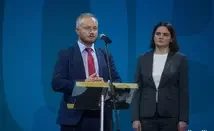Can a couple of letters or commas affect the political situation in the country? In Belarus, the country where the language issue has always been highly topical, this is already the case.
The bill regulating the rules of the written Belarusian language was adopted by Belarusian parliament at the first reading on Oct. 24. When it becomes a law (there are no doubts about that) Belarusian orthography and punctuation rules will be slightly altered. However, the change itself is not as important as the very fact of the language reform. It is very much likely, that in the nearest future no form of Belarusian orthography other than the official one will be allowed for use in mass media. Why is this so important? Here’s the catch: the leading independent media outlets adhere to “tarashkevitsa”, the unofficial Belarusian orthography.
Some history
The Stalin’s rule has not only eradicated the Belarusian intellectual elite (the exhaustive interview on this topic can be found here), but also transformed the Belarusian language. The language reform of 1933 introduced significant changes to the Belarusian language, making it look and sound more similar to Russian. All linguists, who opposed the reform, were executed. In the early 1990’s the pre-reform orthography, the so-called “tarashkevitsa” was revived by the opposition, as opposed to “narkamauka”, the russified version of Belarusian. (read more about the history of the Belarusian language here)
“narkamauka” vs “tarashkevitsa”
Today, the whole system of Belarusian education, all state-owned and many independent mass media use the official, “narkamauka”-based variation of the Belarusian orthography. “Tarashkevitsa”, however, became the language of cultural protest against the policy of russification, which continues under the regime of Lukashenka. The statements and leaflets of oppositional parties are often printed in “tarashkevitsa”; it is also widely used by the free-thinking internet users on blogs and forums. The leading independent Belarusian-language media, such as the Belarusian Service of Radio Liberty and "Nasha Niva" also use „tarashkevitsa“. If the use of “tarashkevitsa” is delegalised, they will face a tough choice. Should the independent media go even deeper underground or remain legal but bending their neck and switch to the new orthography?
 Aliaksandar Radzkou |
During the bill’s presentation in the Parliament, Aliaksandar Radzkou, Minister of Education, told the deputies that “in some cases the problems of the unity of Belaruisian language get politically colored. This law will become an effective instrument of stopping the unreasonable and illegal use of the so-called “tarashkevitsa” in the press”. According to Radzkou, the bill should “ensure the unity of the Belarusian-language press”.
 Zmitsier Sauka |
Surprisingly enough, some former champions of “tarashkevitsa” are seeing the bill as a possible chance to unify the nation and strengthen the position of the Belarusian language.
 Siarhey Dubavets |
On one hand, the new law will probably be used as a repression tool. Bending to the will of authorities would be a humiliation to the independent press. On the other hand, the “language bill” may indeed help to overcome political barriers created by the confrontation between “tarashkevitsa” and “narkamauka”. The choice will not be an easy one, but there’s still time to think it over: the new law will come into effect on Sept. 1, 2010.
























